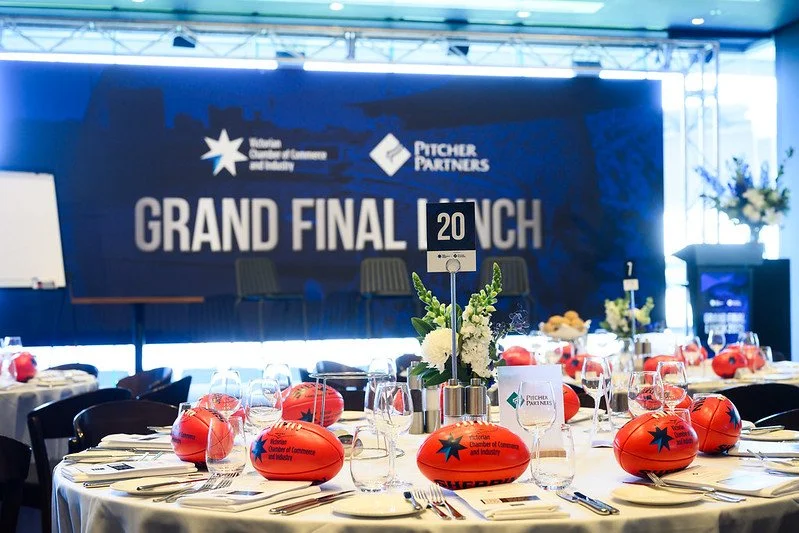What the AFL Grand Final teaches us about reputation and trust in business
Photo courtesy Victorian Chamber of Commerce & Industry - AFL Grand Final Lunch, MCG, 24 Sept, 2025
Every year the AFL Grand Final gives us more than a result. It shows how trust is won, tested and reinforced in real time. Clubs do not just compete on talent. They compete on reputation. The lessons translate cleanly to any organisation that needs stakeholders to believe, choose and stay.
1) Reputation is built before the big day
Premierships are shaped in the months before the siren. Systems, standards and selection integrity create consistency under pressure. In business, reputation is set by the habits you practise when no one is watching. Clear decision rights, tough calls made early, and leaders who model the standard mean customers and regulators are not surprised when the heat arrives.
2) Performance must match the promise
Every club sells a story about effort, connection and accountability. On Grand Final day the story meets reality. If a team’s pressure, structure or discipline drops, the brand takes a hit no matter what the marketing says. For companies, the same rule applies. If service levels, product quality or safety standards fall short of your stated values, trust erodes quickly. Align claims with what you can deliver every week, not just in campaign season.
3) Selection signals your values
Who plays and who is left out is a public statement about merit, role clarity and standards. Businesses signal the same through promotions, board appointments and supplier choices. If you reward results without regard for conduct, people notice. If you back capability and character together, trust grows inside and outside the organisation.
4) Crisis moments are trust moments
Umpiring calls, injuries and momentum swings test resilience. The best teams do not panic. They adapt, communicate and return to their system. For leaders, crises are when stakeholders decide if they believe you. Tell the truth early, show your plan, front the scrutiny, and keep your cool. You will not please everyone, but you will keep credibility.
5) Fans are not a mailing list
Members and supporters invest money and emotion. They want to be respected, heard and included. Businesses have customers, investors, employees and communities who expect the same. Speak in plain language. Explain decisions. Close the loop when feedback is given. The goal is not noise. The goal is participation that builds a stronger club or company over time.
6) Culture is the game plan you live
Grand Final winners look connected. Effort covers mistakes because the system is trusted. In organisations, culture is not posters. It is standards, coaching and honest review. Keep a simple playbook, teach it well, measure the few things that matter and celebrate behaviours you want repeated.
How to apply this on Monday
Write your promise in one sentence. Test a current decision against it.
Publish your selection rules for promotions and projects. Be explicit.
Run a two-page crisis drill. Define roles, messages and first actions.
Report one metric that proves delivery against your promise each week.
Ask one stakeholder group what you should stop, start and continue, then act on it.
Reputation is not a trophy. It is your licence to operate. Like a premiership, it is earned through clear standards, honest effort and performance that matches the promise when it matters most.

